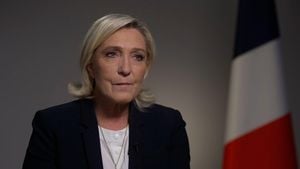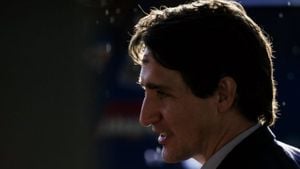With the 2024 U.S. presidential election heating up, social media platforms, particularly TikTok, are emerging as powerful tools for candidates aiming to connect with young voters. The app, known for its short, engaging video content, has been pivotal for political campaigns, providing platforms for candidates to express their identities and campaign messages creatively.
Vice President Kamala Harris has been particularly successful on TikTok, amassing over 3.6 million followers. Her team has rapidly adapted to the platform, utilizing trending memes and viral content effectively, making her campaign feel more relatable to younger demographics.
From the moment Harris's campaign took over President Joe Biden's former TikTok account, they reported substantial increases in follower count and engagement. Within just one week, the account was able to grow fivefold, sparking conversations across various social media platforms.
Harris's content boasts millions of views per post, showcasing the strategy's effectiveness. Influencers and creators, like V Spehar, commend the campaign's ability to tap directly into the audience's interests and humor, distinguishing it from more traditional political messaging.
The campaign employs sarcasm and humor to create content that's not just informative but fun. This approach has revitalized interest and enthusiasm for the upcoming election, with the Harris campaign positioning itself as not just another political entity but as part of the TikTok culture.
Meanwhile, Minnesota Governor Tim Walz, as Harris's running mate, has also jumped on the TikTok bandwagon. His debut video, featuring his dog Scout, presented him as “everyone's Midwestern dad” and sparked positive reactions across the platform.
Walz's strategy mirrors Harris's, aiming to connect with voters on a personal level. His account showcases his candid personality and everyday moments, aiming to engage younger voters accustomed to such relatability on social media.
For Walz's digital director Hannah Flom, the objective was crystal clear: bring the stakes of the election directly to younger voters. Making sure the governor interacts personally with the electorate via TikTok ensures potential voters see genuine moments from their candidate.
Since both Harris and Walz are using humor and relatable content, they have raised concerns within the GOP campaign strategies. Former President Donald Trump has relied heavily on his own social media platform, Truth Social, which has struggled amid declining engagement and user interest.
Interestingly, the digital divide is becoming apparent. Trump’s TikTok presence may not resonate as effectively with younger audiences compared to Harris's more modern and engaging content.
The meme culture surrounding this election has not only shaped social interactions on platforms like TikTok but also defined political narratives. Memes, as cultural snippets, transcend traditional political communication, making complex issues seem relatable and engaging.
Despite some challenges, Harris's successful embrace of TikTok has demonstrated the platform's potential impact on political campaigns. It enables her to cultivate connections and spark conversations among younger citizens, which is critical for increasing voter turnout.
Focusing on the longevity of memes, experts suggest they should carry authentic messages to sustain engagement. Memes can backfire, especially if perceived as too forced or misplaced, so authenticity should always be at the core of any campaign meme strategy.
Statistics reveal the massive engagement levels for Harris, with 46 million mentions across social media platforms recently. Trump trailed behind with about 34 million mentions, showcasing how the digital narrative is evolving and the importance of adapting to current trends.
Democratic strategists believe this engagement surge can translate to real-world results. With efforts aiming at converting online enthusiasm to offline voter turnout, campaigns are becoming more adept at leveraging social media platforms.
Meanwhile, Harris's use of trending TikTok formats continues to attract younger voters, who are becoming more engaged than ever before. This focus doesn't just bring attention; it creates spaces for discussions about pressing political issues.
Polling data indicates young voters are increasingly registering to vote, hinting the strategies might be working. Recent figures showed over 230,000 individuals registered through Vote.org after Biden's announcement, with 18% being first-time voters aged 18.
Within this dynamic election climate, the authenticity brought by TikTok could play a pivotal role. Voter excitement and enthusiasm are becoming tangible forces driving this campaign, showing the blend of politics and social media is more than just modern expediency—it's becoming foundational.
Looking forward, strategic envisioning, including focused campaigns aimed at Gen Z, seems set to transform the electoral process. Candidates equipped to navigate digital terrain may hold significant advantages moving toward election day.
Overall, as TikTok continues to shape political landscapes, it's clear the 2024 election brings with it new methodologies for candidates to engage and rally voters. The combined efforts of Harris and Walz to reinvigorate the electoral process provide insights not just for today but for the political campaigns of tomorrow.
The intersection of social media and politics holds tremendous potential, showing how future elections may look vastly different from those of the past. Candidates who fully embrace these tools could redefine voter engagement and participation for years to come.



